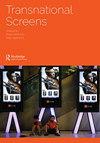不稳定的西班牙国家电影:作为“国家利益电影”的Surcos/Furrows (1951)
IF 0.4
0 FILM, RADIO, TELEVISION
引用次数: 0
摘要
在佛朗哥统治下的西班牙,国家利益奖成为决定最能反映国家精神的电影的国家战略,正如独裁政权所理解的那样。然而,这种逻辑的缺陷在1951年索尔科斯/弗罗斯成功获胜时就很明显了。在这篇文章中,我认为约瑟夫·安东尼奥·尼夫斯·康德的电影在形式上和政治上两个不同的方面破坏了国家电影的概念。首先,弗罗斯呈现了一种美学、流派和意识形态话语的混合,这与弗朗哥主义国家提出的僵化的电影模式是不可调和的。影片中相互交织的话语融合对国家利益奖设定的狭隘标准提出了质疑,这可以从弗罗斯保守但持不同政见的意识形态及其对外国电影的影响中看出。其次,该奖项揭示了国家内部的紧张局势——因为正是国家电影学院本身预示了一部削弱佛朗哥政权所青睐的民族主义话语的电影。本文章由计算机程序翻译,如有差异,请以英文原文为准。
Destabilizing Spanish National Cinema: Surcos/Furrows (1951) as a ‘Film of National Interest’
ABSTRACT Under Francoist Spain, the National Interest awards became the state strategy to determine the films which best mirrored the national spirit, as understood by the dictatorship. However, the flaws of this logic were evident when Surcos/Furrows managed to win in 1951. In this essay, I argue that José Antonio Nieves Condes’ film destabilized the concept of national cinema on two different fronts: formally and politically. First, Furrows presents a mix of aesthetics, genres and ideological discourses that is irreconcilable with the rigid mode of cinema proposed by the Francoist state. The interwoven discursive confluence in the film problematizes the narrow criteria set by the National Interest awards, something that can be seen in Furrows’ conservative but dissident ideology and its foreign cinematic influences. Second, the award reveals the internal tensions within the state – as it was the state film institute itself that heralded a film that undercut the nationalist discourses favored by Franco’s regime.
求助全文
通过发布文献求助,成功后即可免费获取论文全文。
去求助
来源期刊

Transnational Screens
Arts and Humanities-Visual Arts and Performing Arts
CiteScore
0.60
自引率
0.00%
发文量
23
 求助内容:
求助内容: 应助结果提醒方式:
应助结果提醒方式:


